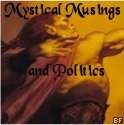 image source
image sourceThe following was taken from the press release of the book: FAMILY OF SECRETS: The Bush Dynasty, America’s Invisible Government, and the Hidden History of the Last Fifty Years....
image source
 Buy Book Now!
Buy Book Now!“A tour de force…Family of Secrets has made me rethink even those events I witnessed with my own eyes.”
-Dan Rather
“One of the most important books of the past ten years”
-Gore Vidal
“Russ Baker’s work stands out for its fierce independence, fact-based reporting, and concern for what matters most to our democracy…A lot of us look to Russ to tell us what we didn’t know.”
-Bill Moyers, author and host, Bill Moyers Journal (PBS)
How did Bush happen? How did George W. Bush, that most improbable of statesmen, rise to the top? Trying to understand this conundrum launched Russ Baker on what became a five-year investigative odyssey. Given the enormous amount of scrutiny the Bush family had faced, it was hard to believe that anything new might be learned. Yet Baker’s findings took him to deeper and deeper levels of revelation, and he came to see that the Bushes had come and gone without our ever learning their true story. It also gradually dawned on him that the unlikely and controversial presidency of “Bush43″ (or “W.”) could only be understood in the context of larger forces that had up to now evaded sustained scrutiny. These forces, Baker saw, are bigger than W., bigger than the Bush dynasty, and so institutionally powerful that they can, to varying degrees, shape one administration after another, Republican and Democratic alike.
Baker began the investigation leading to FAMILY OF SECRETS with a narrow forensic approach. He studied the carefully constructed public persona of George W. Bush. Almost every popular belief about the man turned out to be based on carefully contrived falsehoods. One of the people orchestrating all this was, no surprise, Karl Rove. But an even bigger factor behind the systematic deception, Baker found, was none other than W’s father George H.W. Bush (”Bush41″ or “Poppy.”) He appeared to be both protecting his son’s political future and hiding something larger and more troubling. This bond of secrecy contradicted the popular impression of a generational struggle between the Georges. The discovery led Baker to the insight that the duo were actually far closer personally than the public had been led to believe- cooperators and confidantes, comrades in arms, really, in some kind of cause that was yet to fully emerge.
Shifting his attention to the elder Bush, Baker found that here, too, reinvention was the very essence of the man. Painstakingly studying the particulars of Poppy Bush’s life, Baker began to grasp that the public portrayal of George H.W. Bush as a bland, patrician, genial bumbler was essentially a clever cover-up. But what was it hiding? From conflicting accounts of Bush41s wartime service to the outsized global reach of Bush’s tiny start-up offshore drilling company, Baker began connecting the dots. Step by step, his research led him to an astonishing truth: that Bush41’s career in oil, politics and diplomacy had provided cover for a secret life-as a clandestine intelligence operative involved with highly sensitive operations, many of them domestic.
The only thing the public knew about Bush41 and the spy world, prior to publication of FAMILY OF SECRETS, was that he spent a single year as CIA director. Appointed by President Ford in 1975 at a time of intense congressional inquiries into CIA abuses, Bush was, according to government and media, a fresh face and outsider who as a former congressman could fend off congressional attempts at oversight.
It is significant, however, that during the same period Congress was also on the verge of reopening inquiries into the death of John F. Kennedy. Baker notes this factor as he begins to tote up curious inconsistencies and anomalies in the elder Bush’s accounts of his activities at the time of Kennedy’s death. Baker presents three faces of George H. W. Bush: the one who cannot remember where he was on November 22, 1963; the one identified (in a declassified FBI memo about the assassination) as a CIA officer working with Cuban exiles; and the one who, identifying himself as an ordinary citizen, calls in a tip on a potential assassin.
“At 1:45 pm on November 22,” Baker reports, Bush Sr. “called the FBI to identify James Parrott as a possible suspect in the president’s murder, and to mention that he, George H.W. Bush, happened to be in Tyler, Texas.” That is, not in Dallas (at least not at that precise moment). While Poppy was making the call fingering Mr. Parrott, Baker writes, Poppy’s own assistant was visiting the suspect at home-thus enabling the Bush aide to provide Parrott with an alibi. This evidentiary daisy-chain begs what follows: an exhaustive examination of Bush’s own furtive activities and his whereabouts that day-and his close ties to a large gallery of intelligence operatives who played a role in the events unfolding in Dallas. Among the subjects of interest: Allen Dulles, a former business associate and close friend of Poppy’s father, the former banker, Senator Prescott Bush. Dulles had been forced out of his post as CIA director by John F. Kennedy-who spent his three years in office virtually at war with the uncontrollable spy agency. Another important figure was Bush’s old friend George de Mohrenschildt, a mentor to Lee Harvey Oswald in the months before the shooting. More than a decade later, after Bush had become CIA director, De Mohrenschildt wrote him a panicked note mentioning Oswald; six months later, De Mohrenschildt was dead from what was described by local police as a self-inflicted shotgun blast.
Baker contextualizes these troubling events by establishing the extent to which Kennedy had alienated the powerful-from the CIA to the FBI leadership, from the mafia to the oil industry, from the Pentagon to major corporate figures. He also demonstrates the crucial role the Bush dynasty, through five generations, played in loyally advancing the agendas of many of these same interests.
The more people Baker interviewed, the more documents he obtained, the more he delved into diverse and often obscure treatises, the more he could see the outlines of an American history that had not been fully told before-a story of behind-the-scenes battles for control of this country’s policies, with incredibly high stakes.
In FAMILY OF SECRETS we learn that it was a business partner and secret-society confrere of Prescott Bush who drew up the blueprint for a new Central Intelligence Agency for President Truman; in retirement, Truman would assert that he had been tricked-and never intended to authorize the CIA’s covert action component. We grasp what the former soldier, Dwight Eisenhower, meant when, leaving the presidency, he warned us of a “military-industrial complex.”
We learn about parallels between Kennedy and Richard Nixon, and how Nixon was battling some of the same interests as Kennedy had at the time of his own downfall (and we get a whole new explanation of Watergate.) We see Nixon’s replacement, Gerald Ford, forced to the right by staffers named Rumsfeld and Cheney, and compelled to appoint Poppy Bush to the CIA directorship.
We come to understand better why so many problems befell an idealistic and naïve Jimmy Carter after he took on the cowboy element in the CIA’s unsupervised covert operations wing. We get an inkling of why Ronald Reagan, notwithstanding his dislike for his primary challenger George H. W. Bush, was compelled to take him on as his vice president. We come to see why Lyndon Johnson, Bill Clinton and Barack Obama were disinclined or unable to seriously challenge the military-industrial-banking complex or the vast and unaccountable spy establishment.
We discover new context regarding the true nature of the relationship between Saudi Arabia’s royal family, the enrichment of the Bushes’ Texas social circle, and our addiction to oil. We are presented with persuasive new facts about the role of foreign dictators and murky international money men in shaping the upward trajectories of our politicians-and the downfall of those who cross these shadowy powerbrokers.
By the time Baker turns to the rise of the George W. Bush, we realize the extent to which we have been duped. We see the supposedly incompetent ne’er-do-well being trained in secret operations and involved in curious international business ventures that he avoided discussing. We also see the hand of the father and his intelligence operative cohorts in erasing all records of W’s misdoings, while a sophisticated disinformation team builds him a résumé befitting a future president. Baker documents how W’s long track record as a womanizer and party animal was laundered via a politically calculated born-again Christian conversion that none dared question. And digging deep into Bush Jr.’s still-murky National Guard service record, Baker provides the most definitive account ever of the events behind Bush’s premature departure from his flying unit and a decades-long cover-up that ensued.
Baker unearths astonishing nuggets even about the most purportedly well-covered events. For example, we learn something new about the motivations behind the US invasion of Iraq, from Texas journalist Mickey Herskowitz, who had worked with Bush on a pre-presidential book. “He was thinking about invading Iraq [back] in 1999,” Herskowitz told Baker. “He said to me, ‘One of the keys to being seen as a great leader is to be seen as a commander in chief… If I have a chance to invade…I’m not going to waste it.”
And finally, we come to grasp how the excesses of W.’s team of national security hardliners and corporation-friendly bureaucrats represented the ultimate triumph of this long-playing clique-the moment when the façade ever-so-briefly slipped and we could see their unapologetic oligarchic mindset and open contempt for democracy.
FAMILY OF SECRETS is massively documented and heavily annotated, but it reads like a spy thriller. Combining gripping stories, explosive revelations and trenchant analysis, Family of Secrets is much more than a new look at a presidential family. It is a secret history of the elites that have shaped American politics over the last century.
Russ Baker is an award-winning investigative reporter with a track record for making sense of complex and little understood matters. He has written for the New Yorker, Vanity Fair, the Nation, the New York Times, the Washington Post, the Village Voice and Esquire. He has also served as a contributing editor to the Columbia Journalism Review. Baker received a 2005 Deadline Club award for his exclusive reporting on George W. Bush’s military record. He is founder of the nonpartisan, nonprofit investigative news site, www.whowhatwhy.com. More information about FAMILY OF SECRETS is available at www.familyofsecrets.com.
Russ Baker{In-Studio}on Alex Jones Tv 1/4:Family of Secrets
Russ Baker{In-Studio}on Alex Jones Tv 2/4:Family of Secrets
Russ Baker{In-Studio}on Alex Jones Tv 3/4:Family of Secrets
Russ Baker{In-Studio}on Alex Jones Tv 4/4:Family of Secrets


































No comments:
Post a Comment